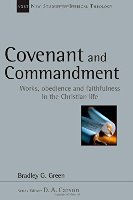A Brief Book Summary from Books At a Glance
About the Author
Bradley G. Green (PhD, Theology, Baylor University) is associate professor of Christian studies at Union University. His varied background includes serving as Latin instructor and Sunday school teacher, and he has written a number of articles for various publications including Churchman, Touchstone Magazine, Chronicles Magazine and The International Journal of Systematic Theology.
Green is also the author of The Gospel and the Mind: Recovering and Shaping the Intellectual Life and Colin Gunton and the Failure of Augustine.
Overview
Bradley Green argues for the reality and necessity of works of obedience on the part of the Christian within a covenantal and Protestant framework. He works through biblical texts as well as Reformed and other theologians to develop the thesis that the believer’s work is vitally related to the cross of Christ and the Spirit’s activity and that the Christian’s faithfulness comes to bear in the judgment on the last day.
Table of Contents
Introduction
Chapter 1: The New Testament and the reality and necessity of works, obedience and faithfulness
Chapter 2: Obedience, works and faithfulness: moving from Old Testament to New Testament
Chapter 3: Old covenant, new covenant and the history of redemption
Chapter 4: The cross and the reality of works, obedience and faithfulness
Chapter 5: Union with Christ and its relationship to works, obedience and faithfulness
Chapter 6: Justification, judgment and the future
Chapter 7: The reality and necessity of works, obedience and faithfulness
Epilogue
Bibliography
Index of Authors
Index of Scripture References
Summary
Introduction
In addition to laying out the design of each chapter, here we consider the main thesis of the book. It is this: the New Testament believer is called to and can actually perform real, meaningful, and necessary obedience in a personal form as the product of a changed life. It is not perfect law-keeping, but it is real obedience which is satisfying to our covenant Lord. These works flow from the cross, are a partial fulfillment of the promised blessings of the New Covenant (Jeremiah 31:31-34, etc.), and are sovereignly elicited by the Holy Spirit. We explore this doctrine of personal obedience by looking to New and Old Testament texts, various biblical-theological issues, the place of the atonement and union with Christ with reference to our works, the role our faithfulness plays at the final judgment, as well as the place of our works in a two-Adam covenantal understanding of redemptive history.
Chapter 1
The New Testament and the reality and necessity of works, obedience and faithfulness
While some interpret New Testament texts which command obedience as commanding the impossible–what we might call “a (hyper, though truncated) ‘Lutheran’ reading”–in fact, this view begs the question of the place of our works in theology. While it is impossible to survey every detail of biblical teaching on the subject, there are fourteen categories which might be helpful in grouping ways that the New Testament deals with our obedience. Here we will list them along with a small sample of texts and then offer some representative support.
Categories of positive “works” language in the New Testament:
1) Loving or knowing God is linked with obedience – John 14:15, 21, 23
2) The ‘conditional’ nature of our future salvation – Romans 11:22
3) Christians must ‘overcome’ if they are ultimately to be saved – Hebrews 10:38
4) The necessity of a great righteousness – Matthew 5:20
5) The requirement of the law being met ‘in us’ – Romans 8:3-4
6) God will efficaciously work ‘in’ us, moving us to obey him – Philippians 2:12-13
7) The necessity of putting to death the old man, by the power of the Spirit – Romans 8: 13-14
8) ‘Faith’ and ‘obedience/works’ used as virtual synonyms – 1 Peter 4:17
9) We are truly judged, or justified, by our works – James 1:22-25; Matthew 7:21
10) The ‘obedience of faith’ – Romans 1:5; Acts 6:7
11) We were created and redeemed for good works – 2 Corinthians 9:8
12) Faith working through love – Galatians 5:6
13) The law affirmed; the law of Christ – Romans 13:9
14) Persons do the works of their Father – John 8:39
Serving as a linchpin of the main argument of the book, Philippians 2:12-13 corresponds to category six above: God will efficaciously work ‘in’ us, moving us to obey him. This sets up the two sides of the (lopsided) equation when it comes to our works: God is the agent working, and his working brings about our own personal and necessary works of obedience. That he efficaciously brings them about does not detract from the need for us to do them; nor does our role as personal agent detract from his superintending our righteous acts. Also in this category is 1 Peter 1:15 which speaks of Christians being guarded through faith, which itself leads to the salvation of their souls. God guards Christians by bringing about an action on their part (exercising faith) which serves in a chain of causes effecting their salvation….
[To continue reading this summary, please see below....]The remainder of this article is premium content. Become a member to continue reading.
Already have an account? Sign In
Buy the books

Covenant And Commandment: Works, Obedience, And Faithfulness In The Christian Life